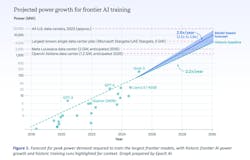EPRI, Epoch AI Joint Report Forecasts Surging Power Demand from AI Model Training
The rapid advancement of artificial intelligence — particularly the training of large-scale models that are used to power many of today’s widely used applications — is driving renewed growth in electricity demand. A new report released from EPRI and Epoch AI forecasts that training a leading AI model is expected to require more than 4 GW of power by 2030, enough to power millions of U.S. homes.
The training of large-scale AI models requires large, localized power supply. According to the report the power demands of training a leading model have more than doubled every year for the past decade, despite rapid efficiency gains.
AI companies have found that increasing model size and complexity provides better performance, which drives the need for additional compute and electrical power. The report found that the AI industry is anticipated to continue to scale up its models in the coming years, irrespective of computational efficiency breakthroughs.
Overall power demand for AI extends beyond large-scale training. Significant power capacity will be allocated towards the deployment of AI to serve users, as well as training smaller models and conducting AI research.
Total AI power capacity in the U.S. is estimated at around 5 GW and is predicted to reach more than 50 GW by 2030, matching the total global demand from data centers and comprising a growing share of overall data center power demands.
"AI applications are becoming prevalent in our daily lives and will likely play a key role in the energy system of the future," said EPRI President and CEO Arshad Mansoor. "Building new infrastructure along with balancing through flexibility in data center design will be critical to accelerate grid connections, while minimizing costs and enhancing system reliability.”
